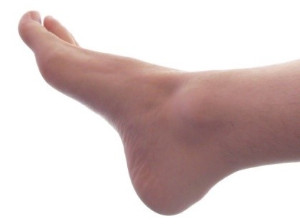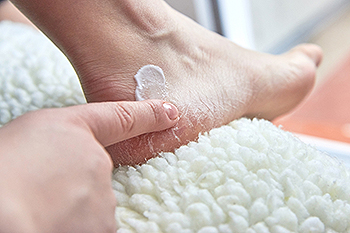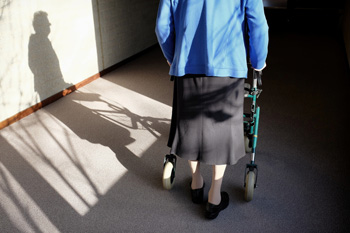Items filtered by date: January 2022
Causes and Relief From Swollen Feet
If you notice that your feet and ankles look puffy or swollen, you may have edema, an accumulation of fluids under the skin. It’s particularly common in the lower legs and feet. Edema, which may cause pain or discomfort when walking around or standing for long periods, can be caused by a number of factors. Among them are ill-fitting shoes, a sedentary lifestyle, being overweight or heat. Luckily, a number of home remedies can help to alleviate the edema, such as keeping your feet elevated when sitting or lying down; eating healthier foods and reducing salt intake; and losing weight. A few simple exercises include standing up and moving around several times a day if you are sitting for long periods, rotating your ankles and bending your knees to increase circulation, and taking a brisk walk in the morning. If swelling persists or becomes painful, it is suggested that you make an appointment with a podiatrist at your earliest convenience for a full examination, diagnosis and other treatment options.
Everyday foot care is very important to prevent infection and other foot ailments. If you need your feet checked, contact Donald Manger, DPM from Associated Podiatric Physicians, PA. Our doctor can provide the care you need to keep you pain-free and on your feet.
Everyday Foot Care
Often, people take care of their bodies, face and hair more so than they do for their feet. But the feet are a very important aspect of our bodies, and one that we should pay more attention to. Without our feet, we would not be able to perform most daily tasks.
It is best to check your feet regularly to make sure there are no new bruises or cuts that you may not have noticed before. For dry feet, moisturizer can easily be a remedy and can be applied as often as necessary to the affected areas. Wearing shoes that fit well can also help you maintain good foot health, as well as making it easier to walk and do daily activities without the stress or pain of ill-fitting shoes, high heels, or even flip flops. Wearing clean socks with closed shoes is important to ensure that sweat and bacteria do not accumulate within the shoe. Clean socks help to prevent Athlete’s foot, fungi problems, bad odors, and can absorb sweat.
If you have any questions please feel free to contact our office located in Hamilton Township, NJ . We offer the newest diagnostic and treatment technologies for all your foot and ankle needs.
Plantar Warts Can Be Treated!
Ways to Repair Cracked Heels
About one-fifth of adults in the United States experience cracked heels, studies show. Besides being unsightly, cracked heels that deepen can also become painful and lead to bleeding. Because there are no oil glands on the feet, they often become dried out. In addition, medical conditions such as diabetes, psoriasis and eczema can promote cracked heels. One of the simplest remedies for cracked heels is a petroleum jelly treatment. It helps reduce moisture loss from the skin and keeps it hydrated. Soak your feet in warm water for about 15 minutes, and then use a pumice stone to scrub off the dried skin. Rinse and pat dry thoroughly. Next, apply moisture lotion to the affected area and cover that with petroleum jelly to seal it in. Put on a pair of wool socks overnight and wash your feet again the next morning. If cracked heels continue to give you problems, it is suggested that you visit a podiatrist who can recommend further treatment options.
Cracked heels are unsightly and can cause further damage to your shoes and feet. If you have any concerns, contact Donald Manger, DPM from Associated Podiatric Physicians, PA. Our doctor can provide the care you need to keep you pain-free and on your feet.
Cracked Heels
Cracked heels appear unappealing and can make it harder for you walk around in sandals. Aside from looking unpleasant, cracked heels can also tear stockings, socks, and wear out your shoes. There are several methods to help restore a cracked heel and prevent further damage.
How Do You Get Them?
Dry skin is the number one culprit in creating cracked heels. Many athletes, walkers, joggers, and even swimmers suffer from cracked heels. Age and skin oil production play a role to getting cracked heels as well.
Promote Healing
Over the counter medicines can help, especially for those that need instant relief or who suffer from chronic dry feet.
Wear Socks – Wearing socks with medicated creams helps lock in moisture.
Moisturizers – Applying both day and night will help alleviate dryness which causes cracking.
Pumice Stones – These exfoliate and remove dead skin, which allows for smoother moisturizer application and better absorption into the skin.
Change in Diet
Eating healthy with a well-balanced diet will give the skin a fresh and radiant look. Your body responds to the kinds of food you ingest. Omega-3 fatty acids and zinc supplements can also revitalize skin tissue.
Most importantly, seek professional help if unsure how to proceed in treating cracked heels. A podiatrist will help you with any questions or information needed.
If you have any questions, please feel free to contact our office located in Hamilton Township, NJ . We offer the newest diagnostic and treatment technologies for all your foot care needs.
Mobility Is Key to Quality of Life in the Elderly
Keeping aging adults ambulatory is considered by many to be essential. Mobility is believed to provide the elderly with dignity, independence, and self-esteem. Foot care plays an important part in the aging adult’s mental health and quality of life, and it should be equal to care they receive for other parts of their body. This is particularly true for elderly patients with chronic diseases, like diabetes. Older adults should be educated on proper foot care, and have their foot health regularly monitored and assessed by a podiatrist. This is important to help the older adults stay mobile while avoiding complications that can result from a foot condition that is ignored or goes undetected. To help ensure your foot health or that of your loved one, it's a good idea to make an appointment with a podiatrist today.
If you need your feet checked, contact Donald Manger, DPM of Associated Podiatric Physicians, PA. Our doctor will attend to all of your foot and ankle needs and provide you with quality treatment.
Geriatrics and Podiatry
When people age, some common issues that may occur are bone density loss, dry skin, poor circulation, and rough brittle nails. These issues may also affect your foot health if the necessary steps are not taken to alleviate the problems.
It is important to take care of your feet because feet that are injured or diseased can affect your overall health. Having painful feet hinders your ability to do daily activities or may decrease your willingness to do the things that you need to do.
Visiting Your Geriatrician
As we age, health problems become more likely, so it is essential to visit your doctor for check-ups to ensure that you are doing the best you can to take care of your health. It is recommended to check your feet frequently for any possible cuts, bruises, swelling, corns or any other irregularities.
Taking Care of Elderly Feet
Cracked or dry feet can be treated by applying moisturizer often. It is also important not to wear old socks because the older the sock is, the higher the possibility there will be that there is bacteria there. Wear fresh socks and make sure they fit properly.
Proper foot health means that you can have a more active lifestyle and you will not be bogged down by pain. Foot health also leads to good circulation, which is paramount for overall health.
If you have any questions, please feel free to contact our office located in Hamilton Township, NJ . We offer the newest diagnostic tools and technology to treat your foot and ankle needs.
The Basics of Plantar Fasciitis
Plantar fasciitis occurs when the plantar fascia—a long fibrous tissue spanning the sole of the foot—becomes damaged or torn due to overuse, obesity, or structural issues with the foot. Pain and stiffness from plantar fasciitis is typically worse in the morning upon waking, and gets better as the body warms up. You can help prevent plantar fasciitis from occurring by warming up before exercising, wearing shoes that fit well with structure in the heel and support in the arch, and gradually build up duration and intensity when modifying your workout routine. If you have pain in your heel, make an appointment with a podiatrist for an accurate diagnosis and treatment plan.
Plantar fasciitis is a common foot condition that is often caused by a strain injury. If you are experiencing heel pain or symptoms of plantar fasciitis, contact Donald Manger, DPM from Associated Podiatric Physicians, PA. Our doctor can provide the care you need to keep you pain-free and on your feet.
What Is Plantar Fasciitis?
Plantar fasciitis is one of the most common causes of heel pain. The plantar fascia is a ligament that connects your heel to the front of your foot. When this ligament becomes inflamed, plantar fasciitis is the result. If you have plantar fasciitis you will have a stabbing pain that usually occurs with your first steps in the morning. As the day progresses and you walk around more, this pain will start to disappear, but it will return after long periods of standing or sitting.
What Causes Plantar Fasciitis?
- Excessive running
- Having high arches in your feet
- Other foot issues such as flat feet
- Pregnancy (due to the sudden weight gain)
- Being on your feet very often
There are some risk factors that may make you more likely to develop plantar fasciitis compared to others. The condition most commonly affects adults between the ages of 40 and 60. It also tends to affect people who are obese because the extra pounds result in extra stress being placed on the plantar fascia.
Prevention
- Take good care of your feet – Wear shoes that have good arch support and heel cushioning.
- Maintain a healthy weight
- If you are a runner, alternate running with other sports that won’t cause heel pain
There are a variety of treatment options available for plantar fasciitis along with the pain that accompanies it. Additionally, physical therapy is a very important component in the treatment process. It is important that you meet with your podiatrist to determine which treatment option is best for you.
If you have any questions, please feel free to contact our office located in Hamilton Township, NJ . We offer the newest diagnostic and treatment technologies for all your foot care needs.





